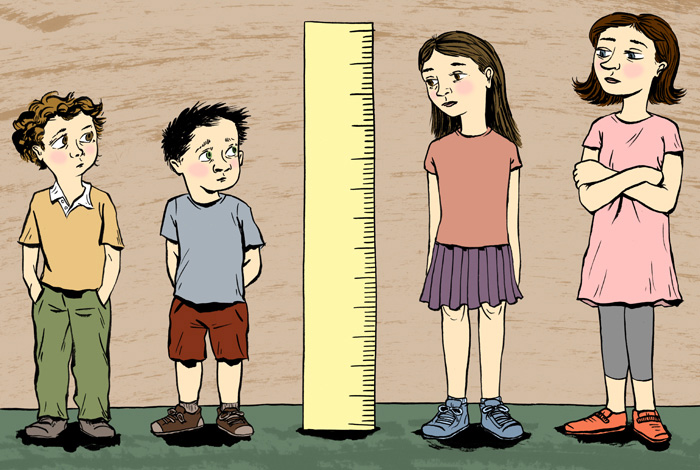My Tablet magazine column this week is about a children’s book that is nominally about being short. But it’s really a book about media and science literacy. Wait, where are you going? I swear it’s unboring. In Short: Walking Tall When You’re Not Tall At All, author John Schwartz debunks all the “research” about short folks being less happy, stupider and poorer than their taller counterparts, and he does so in a chatty, funny way that mixes memoir (the guy grew up teeny in Texas) and reported non-fiction. The book awesomely teaches kids to question the way studies are constructed and funded…and it teaches them the right questions to ask. Does this study distinguish between correlation and causation? How big is the sample and how well-designed is the study? Do the researchers have an agenda — are they, say, trying to sell humane growth hormone? How did the media report the study’s findings, and is the headline-driven approach really representative of what the study actually FOUND?
Josie, my book-devouring 8-year-old, is reading Short now, despite being tall. And being a girl. I’d say it’s really aimed more at boys. (I think short girls face different challenges from short boys, mostly surrounding cuteness and authority and sexuality, and girls’ issues manifest more in adolescence — this book is for younger readers, aged 9-12 or so.) But Josie is old enough to be interested in marketing and media and the misuses of science, and she’s intrigued. (She’s also young enough to be horrified that there are people out there who think they are “too flat-chested,” as the book mentions. I explained breast augmentation surgery to her and she just stared at me, open-mouthed. “No. Way.” I had to tell her “Way.”)
As I read Schwartz’s book, I kept thinking about the research about weight and health that Crystal Renn and I presented in Hungry. The bias toward fat people is even stronger than the bias toward short people. It is very difficult to show the difference between correlation and causation when it comes to ill health and fat. (Does fat cause illness or are the two merely correlated, so that if you’re predisposed to certain conditions you’re also predisposed to be fat? Does losing weight and keeping it off — two very different propositions, give that between 90 and 95% of people who lose weight gain it back — make people less likely to have the conditions correlated with obesity? How much of the negative health outcomes associated with obesity are actually caused by dieting or by fat bias? Is the research on fat being conducted by people who run weight-loss clinics or who are trying to sell diet drugs?) We asked a lot more questions about genetics than Schwartz does, but I was still struck by the similarities among research into shortness and research into fatness. I was also interested to see how INGRAINED people’s beliefs about short people are, despite all evidence to the contrary. And of course, how hidden agendas run rampant. (Schwartz tells the story of a researcher whose work indicated that short kids don’t grow up to be more miserable than tall kids, who then found his work quoted by the FDA as justification for the need for human growth hormone treatments, since short kids have such worse outcomes than tall kids!)
Anyway, I think it’s a really good book. It’s a quick, thought-provoking read for grownups, and I think an important one for kids. Full disclosure: I know Schwartz virtually through The Well, the virtual community we both participate in, but we’ve never met.
Big ups.


Yes, but. I love Randy Newman.
Sounds like an interesting book. Thanks for bringing it to my attention. I’m glad your daughter is enjoying it.
I would have guessed that you were a Randy Newman fan though – he is often pretty snarly himself – although more tounge in cheek.
Lyrics from his song: The world just isn’t fair
”
When Karl Marx was a boy
he took a hard look around
He saw people were starving all over the place
while others were painting the town
The public spirited boy
became a public spirited man
So he worked very hard and he read everything
until he came up with a plan
There’ll be no exploitation
of the worker or his kin
No discrimination ’cause of the color of your
skin
No more private property
It would not be allowed
No one could rise too high
No one could sink too low
or go under completely like some we all know
If Marx were living today
he’d be rolling around in his grave
And if I had him here in my mansion on the hill
I’d tell him a story t’would give his old heart
a chill
It’s something that happened to me
I’d say, Karl I recently stumbled
into a new family
with two little children in school
where all little children should be
I went to the orientation
All the young mommies were there
Karl, you never have seen such a glorious sight
as these beautiful women arrayed for the night
just like countesses, empresses, movie stars and
queens
And they’d come there with men much like me
Froggish men, unpleasant to see
Were you to kiss one, Karl
Nary a prince would there be
Oh Karl the world isn’t fair
It isn’t and never will be
They tried out your plan
It brought misery instead
If you’d seen how they worked it
you’d be glad you were dead
just like I’m glad I’m living in the land of the
free
where the rich just get richer
and the poor you don’t ever have to see
It would depress us, Karl
Because we care
that the world still isn’t fair”